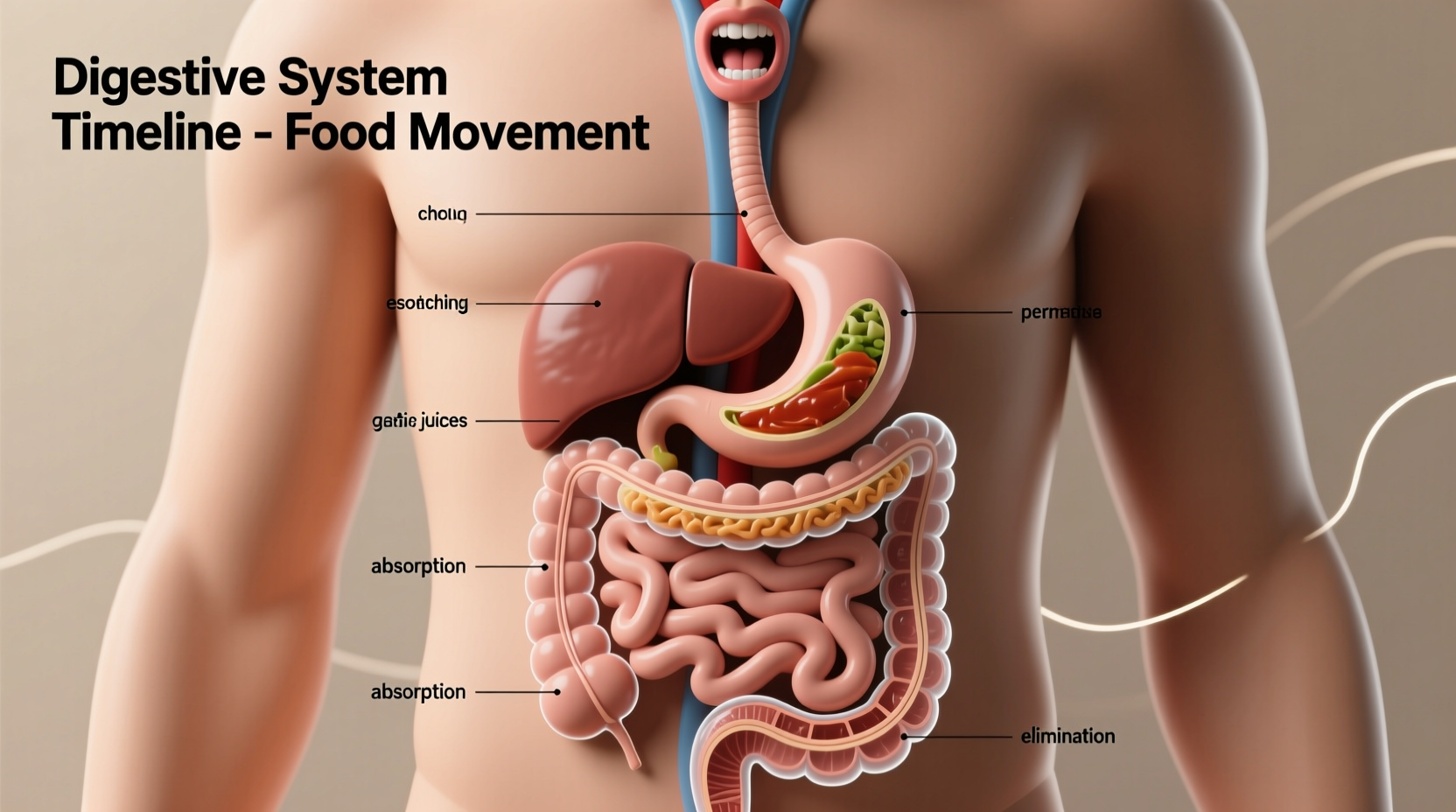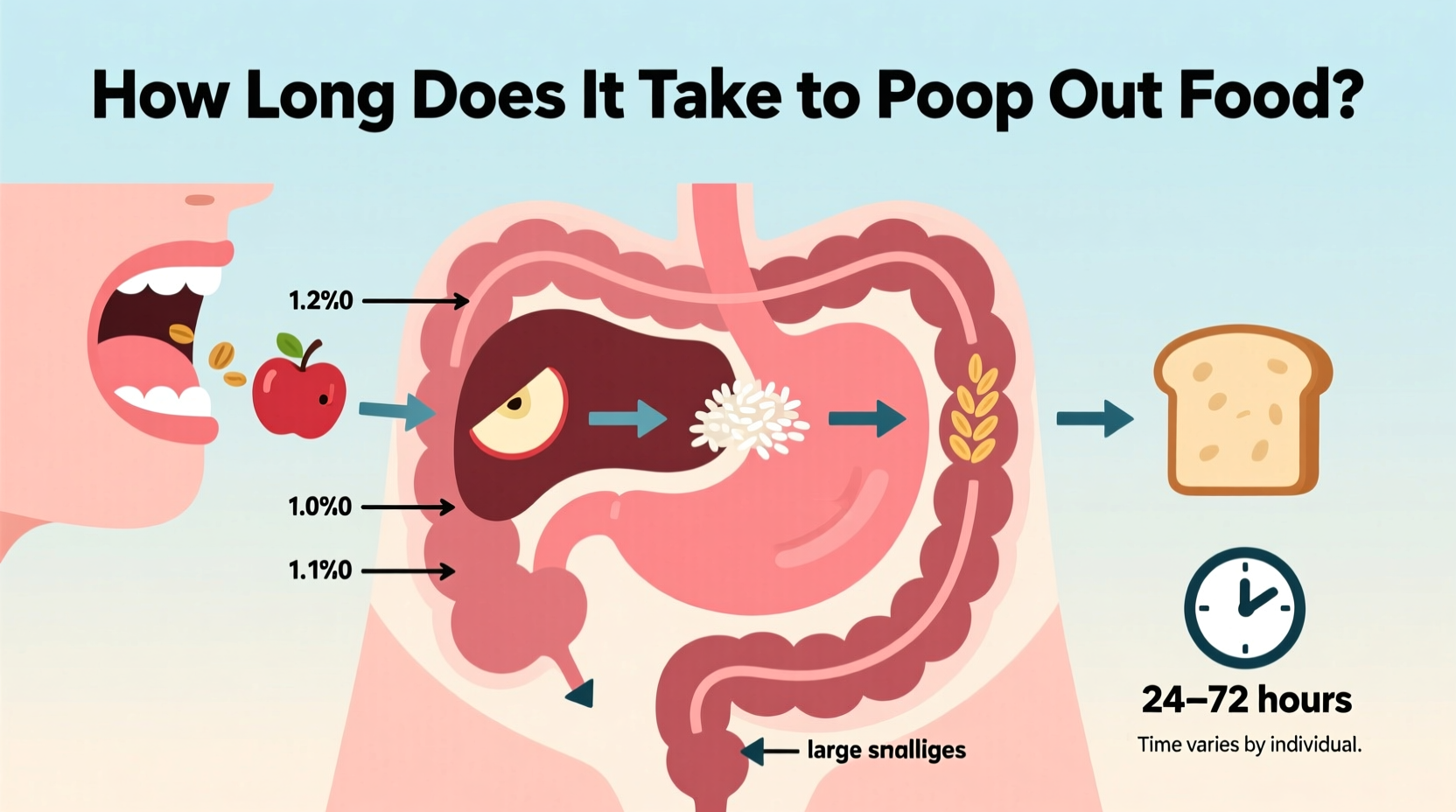Understanding Your Digestive Timeline
When you're curious about how long does it take to poop out food, you're actually asking about gastrointestinal transit time—the complete journey from plate to toilet. This biological process isn't as straightforward as many assume, with multiple stages each contributing to the final elimination timeline.
The Digestive Process Unfolded
Your food begins its journey the moment you take that first bite. Digestion starts in your mouth with chewing and saliva enzymes breaking down carbohydrates. From there, food travels down your esophagus to your stomach, where it mixes with acids and enzymes for 2-5 hours.
Next, partially digested food enters your small intestine—the primary nutrient absorption site—where it spends 6-8 hours. Finally, what remains moves to your large intestine (colon), where water is absorbed and waste forms. This final stage typically takes 10-59 hours, making it the most variable part of the digestive process.

Factors That Determine Your Personal Transit Time
When researching how long does it take for food to be digested and pooped out, you'll find significant variation between individuals. Several key factors influence your unique digestive speed:
Dietary Composition Matters Most
The specific foods you eat dramatically impact digestion duration. High-fiber foods like fruits, vegetables, and whole grains typically move faster through your system than low-fiber processed foods. Protein and fat content also affect transit time—fatty foods often slow digestion while fiber-rich foods accelerate it.
| Food Type | Estimated Transit Time | Digestive Impact |
|---|---|---|
| High-fiber foods (apples, broccoli) | 24-36 hours | Accelerates movement |
| Lean proteins (chicken, fish) | 28-40 hours | Moderate speed |
| Fatty foods (fried items, cheese) | 40-72+ hours | Slows digestion |
| Processed carbohydrates | 30-50 hours | Variable effects |
Individual Physiology and Lifestyle Factors
Beyond diet, your personal biology plays a crucial role. According to the National Institute of Diabetes and Digestive and Kidney Diseases (NIDDK), factors including hydration status, physical activity level, stress, age, and underlying health conditions all influence gastrointestinal motility. Regular exercise can shorten transit time by up to 30%, while dehydration may significantly prolong it.
When Digestion Times Raise Concerns
While how long it takes to poop out food after eating varies naturally, extremely fast or slow transit times may indicate underlying issues. Consistently eliminating waste in less than 24 hours could suggest diarrhea or malabsorption, while transit times exceeding 72 hours might indicate constipation.
The American Gastroenterological Association notes that significant deviations from your personal norm—especially when accompanied by pain, blood in stool, or dramatic weight changes—warrant medical consultation. Normal bowel movement frequency ranges from three times daily to three times weekly, but consistency matters more than frequency.
Optimizing Your Digestive Health
If you're wondering how to speed up digestion to poop or regulate your system, consider these evidence-based approaches:
- Increase daily fiber intake gradually to 25-30 grams through fruits, vegetables, and whole grains
- Maintain consistent hydration with at least 8 glasses of water daily
- Incorporate regular physical activity, even just 30 minutes of walking
- Establish consistent meal times to regulate your digestive rhythm
- Consider probiotic-rich foods like yogurt or kefir to support gut bacteria
Remember that sudden, drastic changes to your digestive pattern should be evaluated by a healthcare professional, especially if accompanied by other symptoms.
Common Questions About Digestion Time
How long does it take for specific foods to digest completely?
Different foods have varying digestion times. Fruits typically take 20-40 minutes in the stomach, vegetables 30-60 minutes, proteins 2-4 hours, and fats 4-6 hours. However, complete transit through your entire digestive system generally takes 24-72 hours regardless of food type.
Can you speed up digestion to poop faster?
Yes, but safely and moderately. Increasing fiber intake, staying hydrated, and engaging in physical activity can help regulate digestion. However, drastic attempts to speed up elimination can cause discomfort or health issues. Most healthy adults don't need to artificially accelerate their natural digestive process.
Does drinking water help move food through your system?
Absolutely. Proper hydration is crucial for healthy digestion. Water helps break down food in your stomach, facilitates nutrient absorption in your small intestine, and keeps stool soft in your colon. The Mayo Clinic recommends adequate water intake to maintain regular bowel function and prevent constipation.
Why do some foods seem to appear in stool undigested?
Certain foods like corn, seeds, or fibrous vegetables often appear partially undigested because human digestive enzymes can't fully break down their cellulose walls. This is normal and doesn't indicate poor digestion—it simply means your body extracted the available nutrients and moved the indigestible portions along.











 浙公网安备
33010002000092号
浙公网安备
33010002000092号 浙B2-20120091-4
浙B2-20120091-4